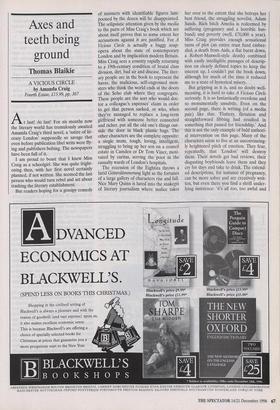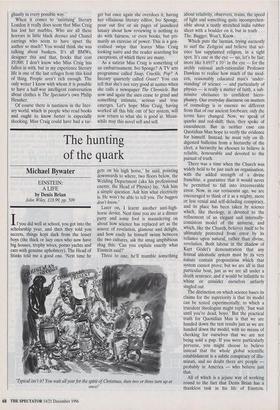Axes and teeth being ground
Thomas Blaikie
A VICIOUS CIRCLE by Amanda Craig Fourth Estate, £15.99, pp. 367 At last! At last! For six months now the literary world has tremulously awaited Amanda Craig's third novel, a 'satire of lit- erary London' supposedly so savage that even before publication libel writs were fly- ing and publishers bolting. The newspapers have been full of it.
I am proud to boast that I knew Miss Craig as a schoolgirl. She was quite fright- ening then, with her first novel certainly planned, if not written. She seemed the last person who would turn rebel and set about trashing the literary establishment. But readers hoping for a gossipy comedy of manners with identifiable figures lam- pooned by the dozen will be disappointed. The solipsistic attention given by the media to the parts of Miss Craig's book which are about itself proves that to some extent her accusations against it are justified. For A Vicious Circle is actually a baggy soap- opera about the state of contemporary London and by implication modern Britain. Miss Craig sees a country rapidly returning to a 19th-century condition of brutal class division, dirt, bad air and disease. The liter- ary people are in the book to represent the haves, the malicious, self-engrossed mon- sters who think the world ends at the doors of the Soho club where they congregate. These people are the sort who would doc- tor a colleague's expenses' claim in order to get that person sacked, or who, when they've managed to replace a long-term girlfriend with someone better connected and richer, put all the old one's things out- side the door in black plastic bags. The other characters are the complete opposite: a single mum, tough, loving, intelligent, struggling to bring up her son on a council estate in Camden or Dr Tom Viner, moti- vated by caritas, serving the poor in the casualty wards of London's hospitals. The recession of the Eighties throws a lurid GOtterdiimmerung light as the fortunes of a large gallery of characters rise and fall. Nice Mary Quinn is lured into the snakepit of literary journalism where malice takes her over to the extent that she betrays her best friend, the struggling novelist, Adam Sands. Rich bitch Amelia is redeemed by suffering (pregnancy and a horrible hus- band) and poverty (well, £70,000 a year). Miss Craig provides enough sensational turns of plot (an entire trust fund embez- zled, a death from Aids, a flat burnt down, a Robert-Maxwell-style death) combined with easily intelligible passages of descrip- tion on clearly defined topics to keep the interest up. I couldn't put the book down, although for much of the time it reduced me to a state of hysterical misery.
But gripping as it is, and no doubt well- meaning, it is hard to take A Vicious Circle seriously. It is so fantastically overdone and so monumentally unsubtle. Even on the second page, there is writing (of a media pair) like this: 'Flattery, flirtation and straightforward fibbing had resulted in something that passed for friendship.' And this is not the only example of bald authori- al intervention on this page. Many of the characters seem to live at an unconvincing- ly heightened pitch of emotion. They fear, repeatedly, that 'London' will destroy them. Their novels get bad reviews, their disgusting boyfriends leave them and they cry for days and take to drink. The extend- ed descriptions, for instance of pregnancy, can be more sober and are creatively writ- ten, but even there you find a shrill under- lying insistence: 'it's all too, too awful and ghastly in every possible way.'
When it comes to 'satirising' literary London it really does seem that Miss Craig has lost her marbles. Who are all these horrors in little black dresses and Chanel earrings who seem to have upset the author so much? You would think she was talking about bankers. It's all BMWs, designer this and that, frocks that cost £9,000. I don't know who Miss Craig has fallen in with, but in my experience literary life is one of the last refuges from this kind of thing. People aren't rich enough. The only writer I know with whom it is possible to have a half-way intelligent conversation about clothes is The Spectator's own Philip Hensher.
Of course there is nastiness in the liter- ary world, which in people who read books and ought to know better is especially shocking. Miss Craig could have had a tar- get but once again she overdoes it, having her villainous literary editor, Ivo Sponge, pour out five or six pages of jaundiced lunacy about how reviewing is nothing to do with fairness, or even books, but pri- marily an exercise of power. This is a gen- eralised swipe that leaves Miss Craig looking naive and the reader searching for exceptions, of which there are many.
As a satirist Miss Craig is something of an embarrassment. Ivo Sponge? A TV arts programme called Snap, Crackle, Pop? A literary quarterly called Grunt? You can tell that she's not very good at names when she calls a newspaper The Chronicle. But now and again the axes cease to grind and something intimate, serious and true emerges. Let's hope Miss Craig, having worked all this bile out of her system, will now return to what she is good at. Mean- while may this novel sell and sell.



















































































































 Previous page
Previous page